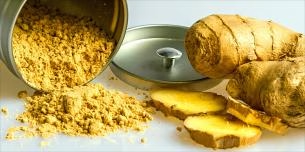Here are 10 spices and herbs every culinary enthusiast should know.
Turmeric
This golden spice has been used for thousands of years to treat a variety of health issues. Turmeric contains many beneficial compounds, particularly the anti-inflammatory curcumin. Many studies have even shown that turmeric has the potential to help fight diseases such as cancer and type 2 diabetes.
Black Pepper
Black pepper contains a compound called piperine, which has been shown to be a beneficial antioxidant. It also stimulates digestive enzymes and improves food absorption. For example, adding it to turmeric tea can increase the absorption of curcumin.
Ginger
Ginger, a close relative of turmeric, has been used for centuries and is believed to aid the digestive system. Its versatile properties, combined with its warmth and antioxidant and anti-inflammatory properties, have made it a popular choice in many cultures for preventing and treating colds and other illnesses.
Cinnamon
Cinnamon has historically been used to relieve a variety of ailments, and modern research has also shown its potential to help control blood sugar and cholesterol. Besides being used in general cooking, cinnamon is also great in baking. Simply sprinkling cinnamon powder on cereal, yogurt, or hot drinks is also delicious.
Cayenne Pepper
Cayenne pepper isn’t a specific type of chili pepper, but rather a collective term for over 50 varieties of red chili peppers. These peppers contain capsaicin, the compound responsible for their spiciness. Capsaicin is believed to be anti-inflammatory, increase appetite, and, after a warming effect, slightly aid metabolism.
Paprika
Spice chef Lior Lev Sercarz’s favorite spice is paprika, typically made from a variety of chilies or red peppers. It’s renowned for its antioxidant content. Paprika contains numerous nutrients; just one teaspoon provides 40% of the recommended daily intake of vitamin A and is rich in iron.
Rosemary
Rosemary is a herb, a relative of mint. It can be used fresh or dried in cooking. It contains rosmarinic acid, an antibacterial and antioxidant, and is rich in polyphenols, which aid digestion, stabilize blood pressure, and relieve discomfort.
Oregano
Oregano, a herb (pictured above in its dried, crushed form), is rich in vitamins and minerals, including vitamins A, C, E, and K, calcium, iron, magnesium, and potassium, as well as a significant amount of dietary fiber. Both the leaves and oil contain antioxidant and antibacterial properties.
Cumin
Cumin contains a variety of flavanols and polyphenols, and many studies suggest it may help treat cancer and diabetes. Cumin is a highly versatile herb, suitable for use in a variety of dishes, including vegetables, meats, stews, and pickles.
Fennel Seeds
One tablespoon of dried fennel seeds provides 2g of dietary fiber, 7% of the recommended daily intake of calcium, and 19% of the recommended daily intake of magnesium. Fennel seeds and fennel both contain anethole, an ingredient that helps the body fight inflammation. Fennel is also an effective milk-boosting food for breastfeeding mothers.


Leave a Reply